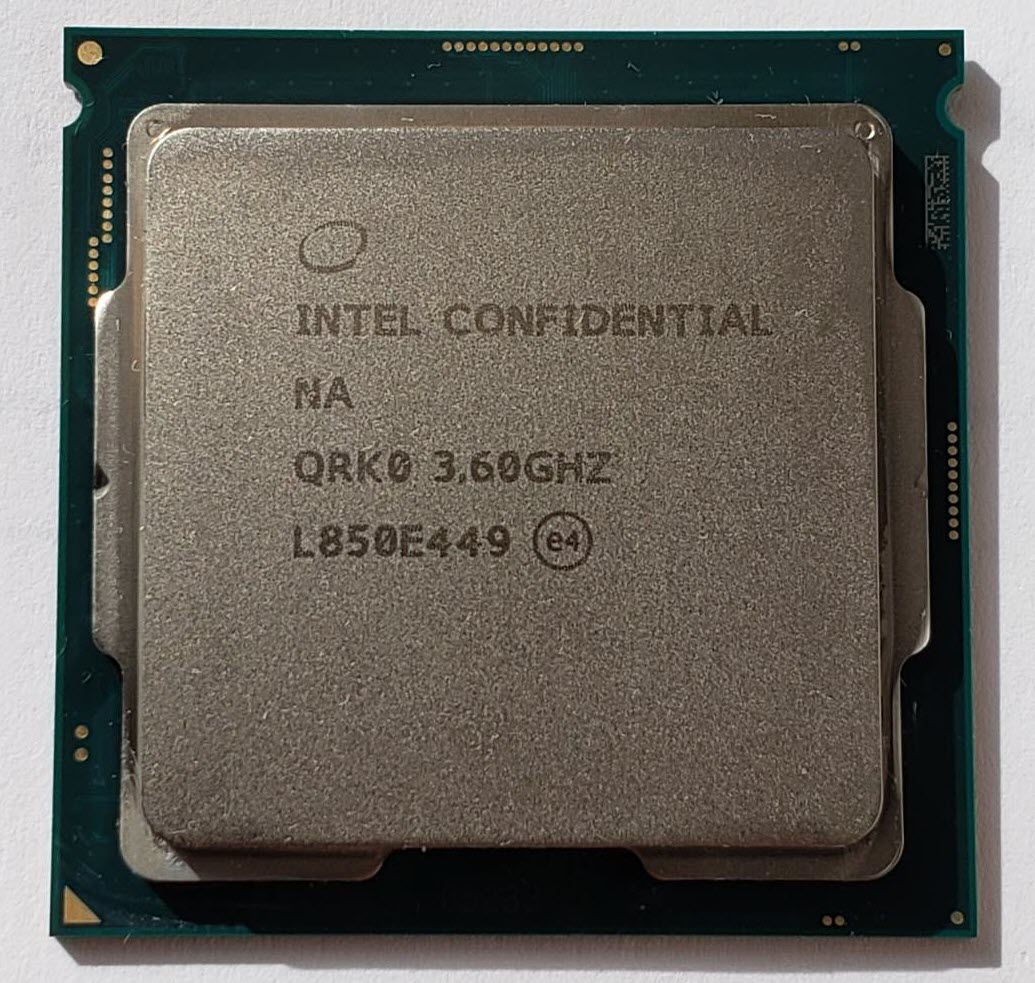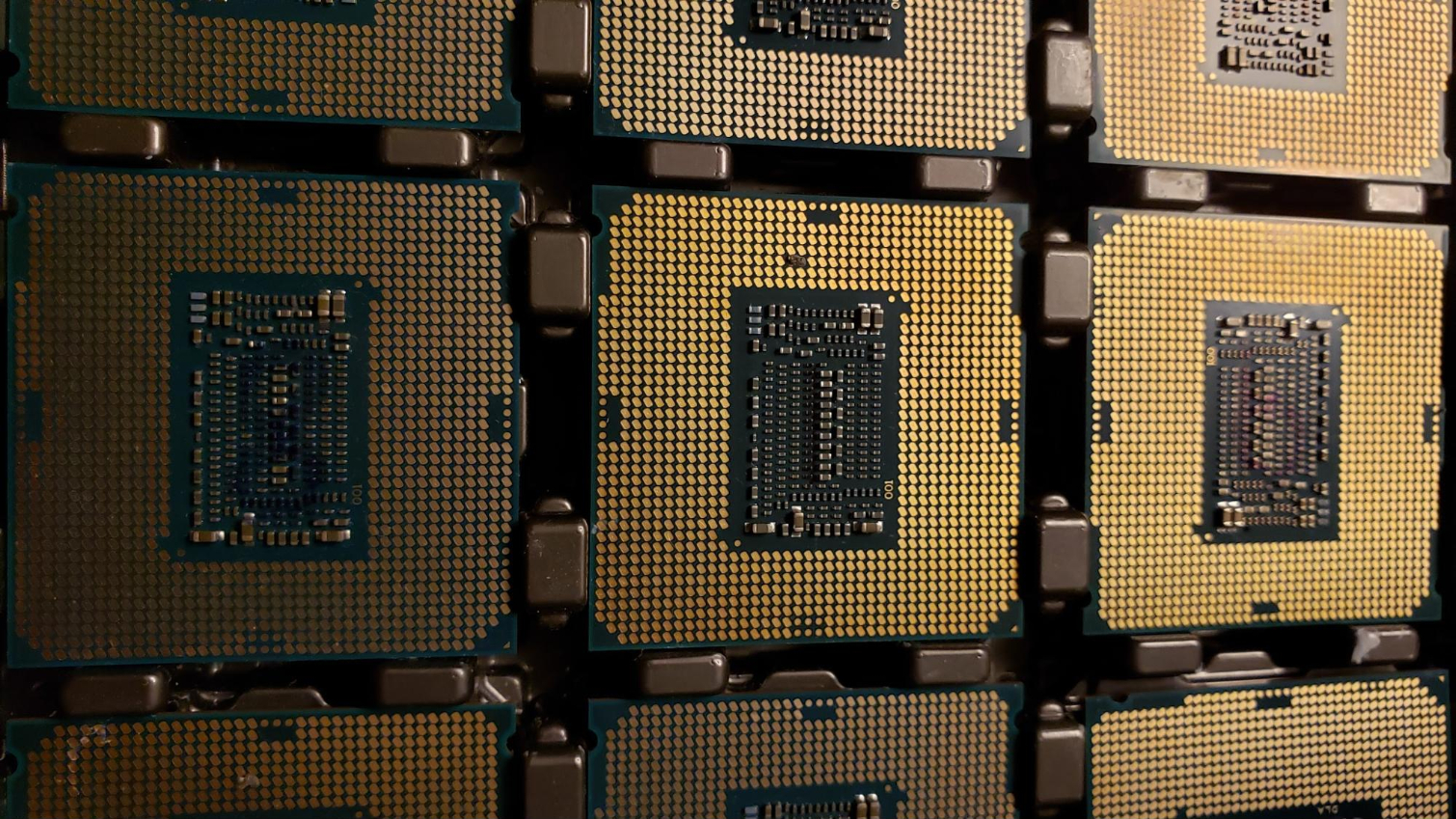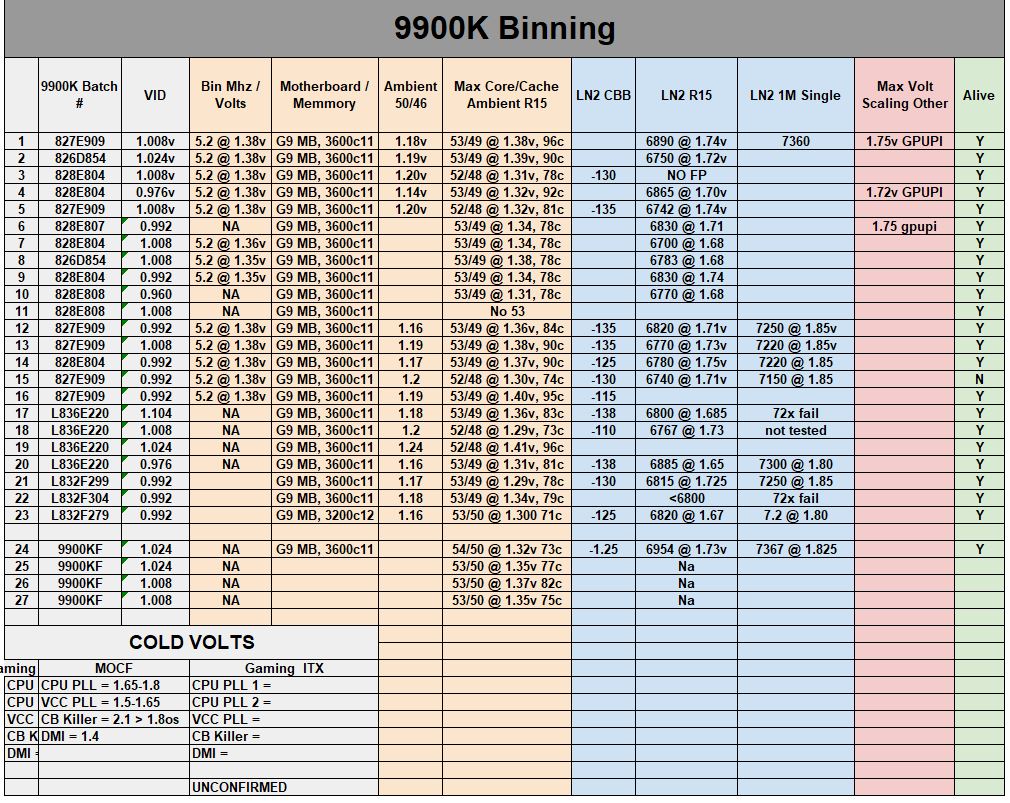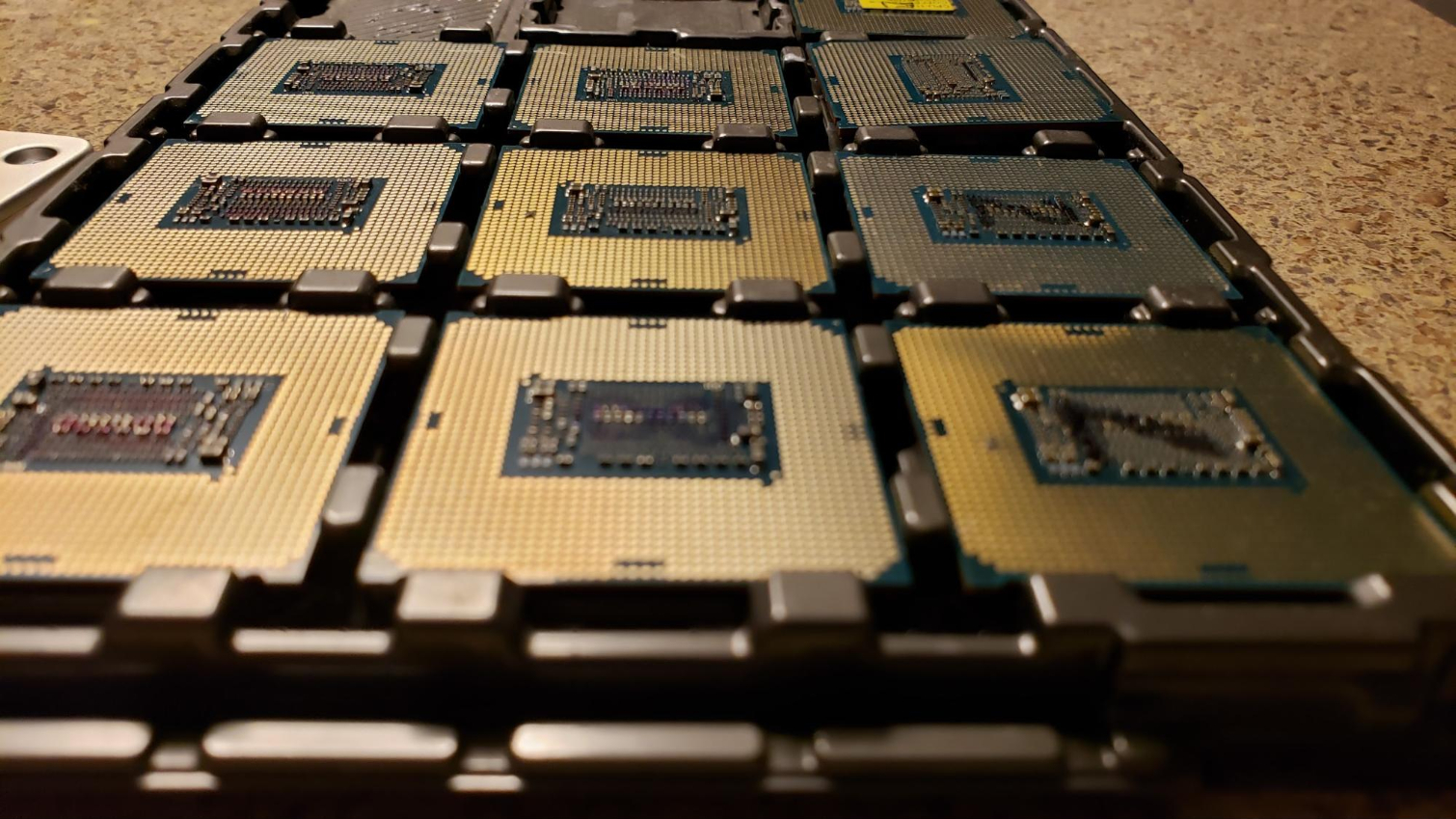Intel's Core i9-9900KF May Overclock Better Than 9900K
Welcome to the Intel Core i9-9900KF. No, that is not a typo. The eight-core 16-thread i9-9900KF is one of the newest mainstream processors from Team Intel. According to the vendor, the only difference between the “K” and “KF” model is that the latter does not have a functioning internal graphics processing unit (iGPU).
The KF chips, which are only available for pre-order, are likely meant to help Intel deal with its production shortages. How else do you explain that the chip goes from around the same price as the Intel Core-9900K, but has one fewer feature?
- See the Best Gaming CPUs you can buy today
I am always drawn to the buy two, get one at the grocery store type deals...Not! But is there more going on here than just a missing or disabled (or defective) integrated graphics processor? Will we be seeing similar things in the future? New steppings, maybe?
Surprisingly, according to the mere five samples I received, the 9900KF appears to overclock better with extreme cooling than the 200 i9-9900Ks I’ve binned. But why? I have so many questions. Let's start trying to answer them.
I am an competitive overclocker. I am not an engineer by any means. That being said, I am limited mostly to trial and error as my main source of information. This can be quite time-consuming, but incredibly valuable! It is the exact opposite of much of the traditional information available online, and in some regards it provides a better personal understanding of what is really going on. There are so many knobs and dials in the BIOS to tweak to perfection and create the harmonious symphony that is a stable overclock. So how does this relate to the 9900KF versus the 9900K? We’ll get there, hold on.
Luckily, I have access to processors and a really awesome team that contributes immensely, which paid off recently when I received 200 i9-9900K processors. What do you do with 200 i9-9900K processors? Well, you sort them one by one. This process is called binning. The secret to great liquid nitrogen (LN2) results is to first “bin” a great processor, and that process begins with testing on standard air cooling.
We use a quick and difficult fully-threaded benchmark for binning processors. Cinebench R15 seems to be the gold standard for this: It generates plenty of heat and pulls plenty of wattage, and it takes just a couple of seconds. If you don’t like R15, you’re welcome to use any program you like. Just make sure to keep the standards the same.
Get Tom's Hardware's best news and in-depth reviews, straight to your inbox.
I suggest a benchmark that gives you a score output at the end, that way you can ensure the processor isn't just throttling through the test due to excessive heat. This can be a rather tedious process with 200 CPUs, though. Imagine sore fingers, strained CPU socket hold downs and thermal paste everywhere. By everywhere, I mean everywhere -- feel free to use your imagination.
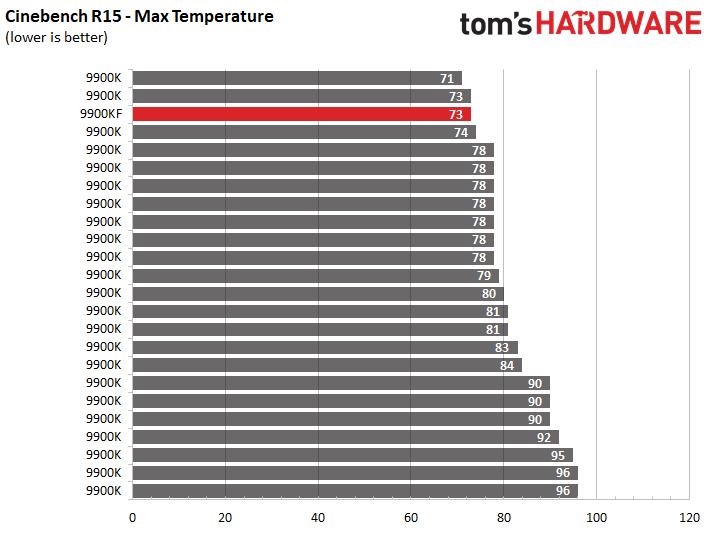
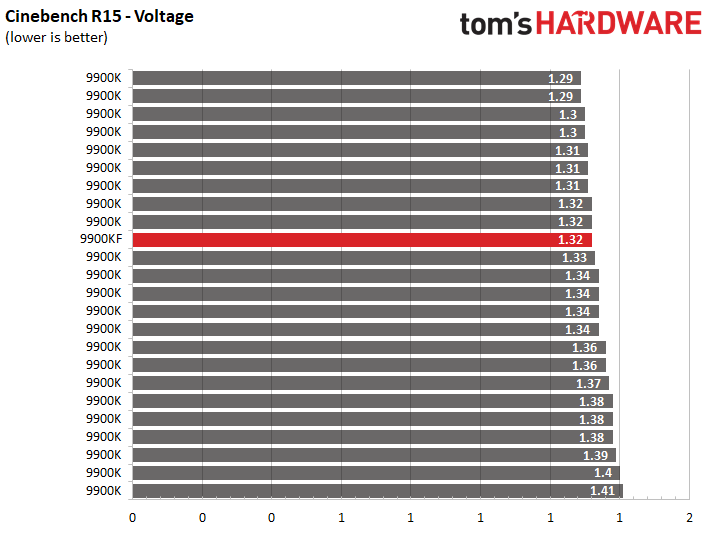
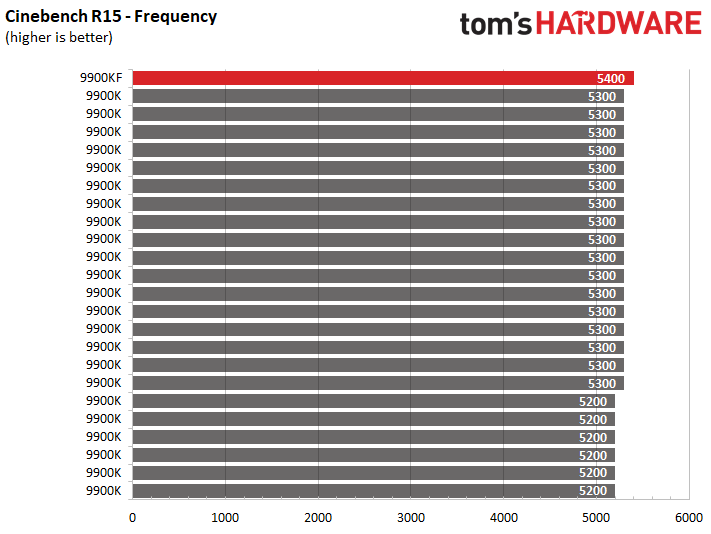
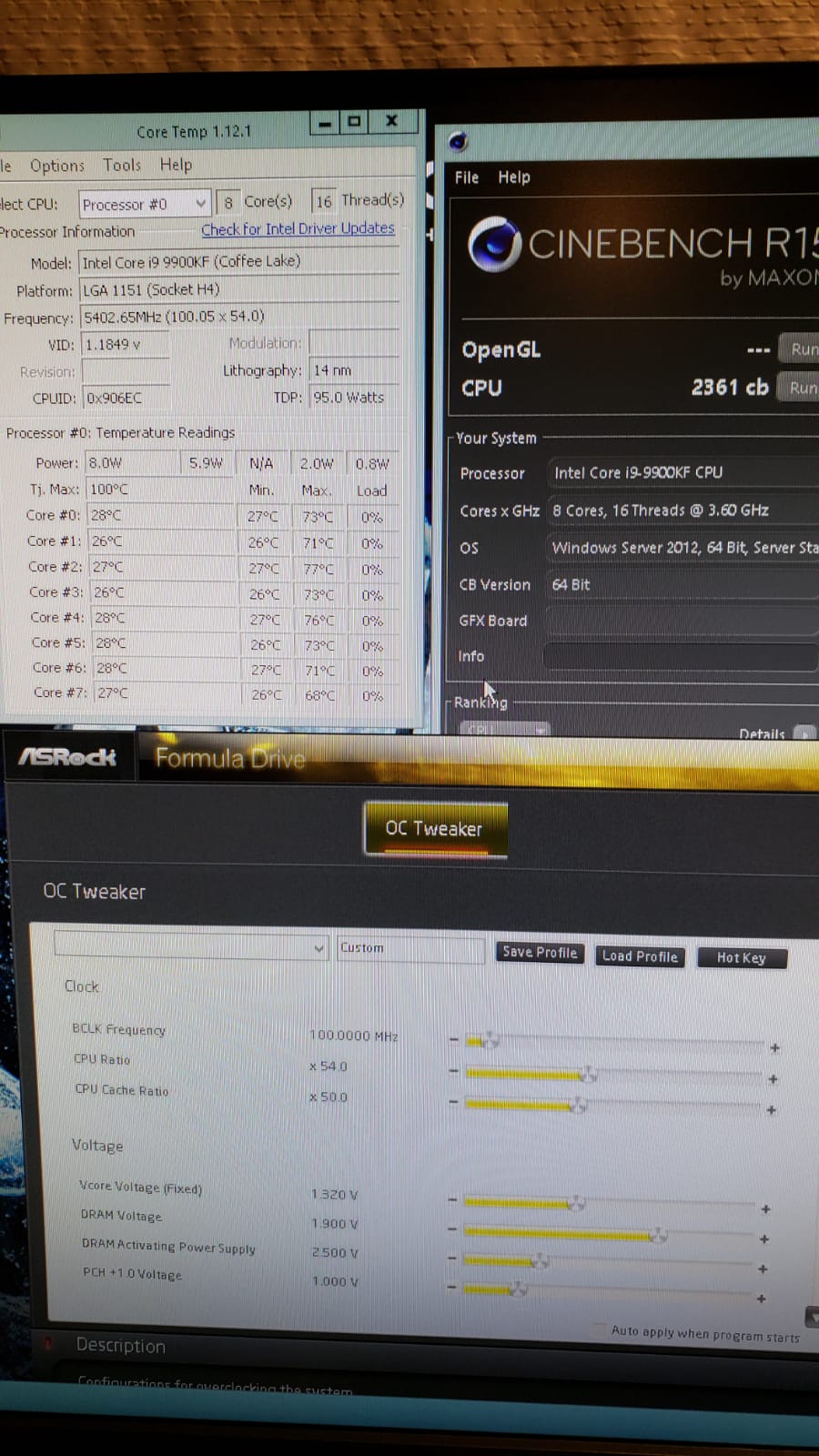
Out of 200 tested 9900Ks, here are the results of binning out the top 23 chips. Nineteen of the processors could do 5.3 GHz during a Cinebench R15 test with normal water cooling, but none could do 5.4 GHz. Out of a much smaller sample size of just five 9900KF processors, one of them does 5.4 GHz! It actually completes three-quarters of an R15 benchmark at 5.5 GHz on normal cooling, which is miles above any of the 9900Ks.
Now, the intelligent readers are thinking to themselves, this doesn’t mean anything. Even 200 CPUs is such a small percentage of all CPUs produced, it’s like making the statement that Earth is covered in ice because that’s all you can see if you’re standing at the North Pole. Well, you aren’t wrong, but this is what we have, so it’s what we will work with. The greater the sample size, the more accurate we can gauge the quality. Yes, 200 chips is small in the grand scheme of things, but I don’t think you will see too many people that have tested more CPUs with extensive documentation like this.
Ok! Binning is complete. We have found the best four or five 9900K CPUs on air and will now try them under LN2 cooling. Why not just use the best one from your air testing? Well, that comes down to the voltage scaling and the actual heat output of that certain processor.
R15 Binning
| Max Passable Freq Water Cooled | |||
| Model | Volts | Frequency | Max Temp |
| 9900K | 1.38 | 5300 | 96 |
| 9900K | 1.39 | 5300 | 90 |
| 9900K | 1.31 | 5200 | 78 |
| 9900K | 1.32 | 5300 | 92 |
| 9900K | 1.32 | 5200 | 81 |
| 9900K | 1.34 | 5300 | 78 |
| 9900K | 1.34 | 5300 | 78 |
| 9900K | 1.38 | 5300 | 78 |
| 9900K | 1.34 | 5300 | 78 |
| 9900K | 1.31 | 5300 | 78 |
| 9900K | 1.33 | 5200 | 80 |
| 9900K | 1.36 | 5300 | 84 |
| 9900K | 1.38 | 5300 | 90 |
| 9900K | 1.37 | 5300 | 90 |
| 9900K | 1.3 | 5200 | 74 |
| 9900K | 1.4 | 5300 | 95 |
| 9900K | 1.36 | 5300 | 83 |
| 9900K | 1.29 | 5200 | 73 |
| 9900K | 1.41 | 5200 | 96 |
| 9900K | 1.31 | 5300 | 81 |
| 9900K | 1.29 | 5300 | 78 |
| 9900K | 1.34 | 5300 | 79 |
| 9900K | 1.3 | 5300 | 71 |
| 9900KF | 1.32 | 5400 | 73 |
| 9900KF | 1.35 | 5300 | 77 |
| 9900KF | 1.37 | 5300 | 82 |
| 9900KF | 1.35 | 5300 | 75 |
If you have a Killawatt wattage meter, or a PSU like the Enermax Maxtytan Series with a wattage display, you can see the difference. Two different CPUs at a 1.35V vCore can pull different wattage. As you can see in the testing above, the R15 load temperatures are all over the map as well.
Some CPUs even run 10 degrees Celsius warmer at the same voltage. We are looking for low load temperature in combination with low voltage while maintaining a high clock speed. This will give us the best chance to use a lot of voltage, yet keep the chip cooler with LN2. A very poor-scaling CPU can be excellent on air/water cooling, but be average to poor on LN2. It actually happens quite often and is a real pain, but it’s quite a rush when you do find a chip that does scale well.
Next I took the 5.4 GHz 9900KF, mounted my LN2 pot on it and away we went. It scaled beautifully and ran nice and cool. With a -193 degrees Celsius container temperature at idle, the CPU can only increase that to -187 degrees Celsius with a massive 1.73 volts being jammed into it. This resulted in a 6.95 GHz R15 run, which is 75 MHz higher than my best run with a standard i9-9900K with LN2 cooling. It was a thrill to be the first person in the world to bench a 9900KF on LN2, so naturally it was a first place score for 9900KFs at the time I did it.
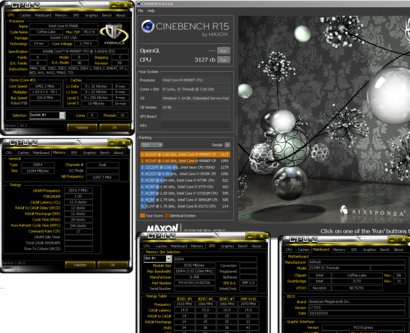
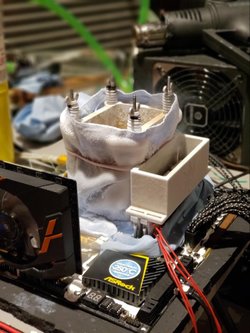
Analyzing all of this info leads to a few theories. Could the 9900KF's have a refined, higher-quality silicon? Intel did similarly with its Engineering Sample (ES) 9900Ks versus retail chips. Retail 9900K CPUs are clocking much better on average than their ES counterparts. I have purchased three retail 9900K CPUs, and unless I'm the luckiest man in the world (I actually am but for other reasons), they were all 6.8 GHz+ chips on LN2. I've tried plenty of ES CPUs that maxed at 6.6 - 6.7 GHz (see above).
Theory two: The 9900KF iGPU has no power pins from socket, which might have some effect beyond the benefit of just disabling the iGPU on a 9900K. Crazier things have happened!
Could we see a refresh of the 9900K series with an updated stepping, higher quality silicon and better oc’ing like the 9900KF? Perhaps ...
Folks, these are theories. I don’t work for Intel. I’m not a shareholder and I don’t have a dog in this fight beyond clawing for every ounce of performance and clocks I can get. If you already own a nice 9900K, should you go out and buy a 9900KF? Probably not, unless you are into overclocking and are displeased with your K-model. If you are in the market to upgrade and are into overclocking, then I would definitely suggest trying the 9900KF if you can find one for sale.
Want to comment on this story? Let us know what you think in the Tom's Hardware Forums.
MORE: Best CPUs
MORE: CPU Benchmark Hierarchy
MORE: All CPUs Content
Photo Credits: Tom's Hardware

A world-champion competitive overclocker who frequently tops the charts at HWBot, a site which tracks speed records, Allen will do just about anything to push a CPU to its limits. He shares his insights into the latest processors with Tom’s Hardware readers from a hardcore, push-it-to-the-limit overclocker’s perspective.
-
Matt_ogu812 Can I buy one of your 9900K that you go beyond 5Gz😊Reply
I'm not into OC'ing but would like something better than the i5 9600k I currently have.
I'm surprised there are no comments.
Many thanks for the interesting article.
